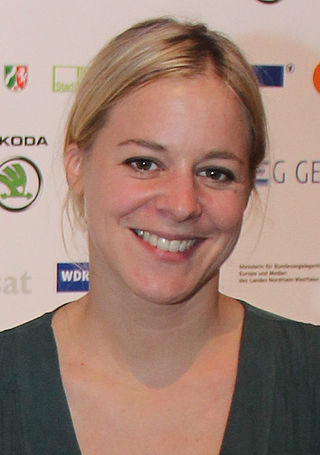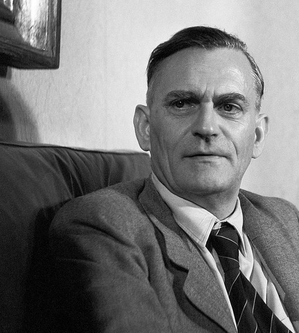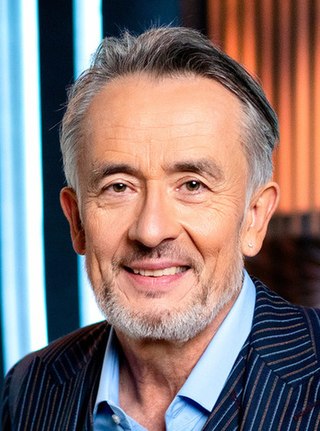Peter von Zahn was a German author, film maker, and journalist.
The Heinrich Mann Prize is an essay prize that has been awarded since 1953, first by the East German Academy of Arts, then by the Academy of Arts, Berlin. The prize, which comes with a €10,000 purse, is given annually on 27 March, Heinrich Mann's day of birth. The laureate is selected by an independent three-member jury which usually includes the previous year's laureate.

Ulrich Tukur is a German actor and musician. He is known for his roles in Michael Haneke's The White Ribbon, Steven Soderbergh's Solaris, the docudrama North Face based on the 1936 Eiger climbing disaster in Switzerland, and as Wilhelm Uhde in Martin Provost's biopic Séraphine.

The Max Born Medal and Prize is a scientific prize awarded yearly by the German Physical Society (DPG) and the British Institute of Physics (IOP) in memory of the German physicist Max Born, who was a German-Jewish physicist, instrumental in the development of quantum mechanics. It was established in 1972, and first awarded in 1973.
The Geschwister-Scholl-Preis is a literary prize which is awarded annually by the Bavarian chapter of the Börsenverein des Deutschen Buchhandels and the city of Munich. Every year, a book is honoured, which "shows intellectual independence and supports civil freedom, moral, intellectual and aesthetic courage and that gives an important impulse to the present awareness of responsibility".

Josef "Sepp" Bierbichler is a German actor.

Klaus Johannes Behrendt is a German actor. Since 1992 he has starred in the Westdeutscher Rundfunk version of the popular television crime series Tatort; he also starred in the 2008 film Die Bienen – Tödliche Bedrohung.
The Walter Schottky Prize is a scientific prize awarded by the German Physical Society for outstanding research work of young academics in the field of solid-state physics. Since 1973 the prize is generally awarded annually. The endowment of the prize with 10,000 euros is contributed by Infineon Technologies AG and Robert Bosch GmbH. The prize is dedicated to Walter Schottky, a physicist and pioneer of electronics.
The Erwin Schrödinger Prize is an annual award presented by the Austrian Academy of Sciences for lifetime achievement by Austrians in the fields of mathematics and natural sciences. The prize was established in 1958, and was first awarded to its namesake, Erwin Schrödinger.

Bernadette Heerwagen is a German actress. She began acting at the age of 16, and has since co-starred in the 1999 production Der Schandfleck, for which she was awarded the Bayerischer Fernsehpreis Sonderpreis in 2000.

Adolf Berthold Ludwig Grimme was a German politician, a member of the Social Democratic Party (SPD). He was Cultural Minister during the later years of the Weimar Republic and after World War II, during the early years of the Federal Republic of Germany. During the Third Reich, he was arrested as a member of the German Resistance and sentenced to prison. After the war, he filed a legal complaint against the judge who had condemned him and others. After years of delays, the case was dropped by the prosecutor.

The Sigmund Freud Prize or Sigmund Freud Prize for Academic Prose is a German literary award named after Sigmund Freud and awarded by the Deutsche Akademie für Sprache und Dichtung. It was first awarded in 1964.

Dominik Graf is a German film director. He studied film direction at University of Television and Film Munich, from where he graduated in 1975. While he has directed several theatrically released feature films since the 1980s, he more often finds work in television, focussing primarily on the genres police drama, thriller and crime mystery, although he has also made comedies, melodramas, documentaries and essay films. He is an active participant in public discourse about the values of genre film in Germany, through numerous articles, and interviews, some of which have been collected into a book.
The Hans Stille Medal was a scientific award of the Deutsche Gesellschaft für Geowissenschaften, given to an individual who made outstanding contributions in the fields of geology and earth sciences. The award was named after German tectonicist Hans Stille and suspended in 2016.
Preis der Stadt Wien für Geisteswissenschaften or Prize of the City of Vienna for the Humanities is a prize awarded by the city of Vienna, Austria, awarded annually since 1947 for outstanding contributions in the humanities. It is worth 10,000 Euros to the winner.

Baran bo Odar is a German film and television director and screenwriter. He is known for co-creating the Netflix series Dark (2017–2020) and 1899 (2022) with his creative and romantic partner, Jantje Friese.

Jantje Friese is a German film producer and screenwriter known for co-creating the Netflix series Dark (2017–2020) and 1899 (2022) with her creative and romantic partner Baran bo Odar.

Gert Scobel is a German journalist, television moderator, author and philosopher.

Annette Dittert is a German author, filmmaker, correspondent, and journalist.
Panorama is the oldest German current affairs television magazine, first aired on 4 June 1961. It is produced by Norddeutscher Rundfunk (NDR), and is aired every third week on Thursdays at 21:45, alternating with Monitor and Kontraste by Das Erste. Anja Reschke has been moderator since 2001. It became popular, with often controversial topics leading to broader discussions and legal consequences.













